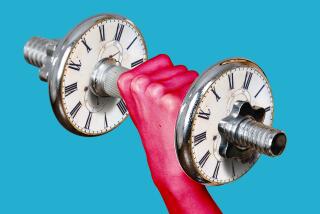The right stretches can ease his pain

I’m 46 years old and in good shape. I jog on a treadmill three times a week for 3 miles and lift weights. But I’m always sore and stiff. Lately I’ve experienced lower back pain and cannot get up to a full sprint on the basketball court because of hip and groin discomfort. What stretching exercises do you recommend?
LANCEChicago
Your stiffness and soreness might be due to the fact that although weight-lifting increases the size of the muscle, it does nothing to make the muscles more flexible, according to Suzanne Martin, an Alameda-based physical therapist, Pilates instructor and author of the book “Stretching.” For that, you need to stretch.
Fitness experts recommend warming up first, because stretching when the body is cold can cause injury to muscles and joints. Swinging the arms and legs is one way to warm up, says Martin. She recommends swinging one leg back and forth while holding onto something for support, gradually working up to bringing the knee to the chest and hugging it.
You can also put one foot up on a ledge or rail, lean into the bent leg, eventually straightening it, then bowing the head and taking a few breaths. Repeat with the other leg. None of these movements should be forced — if you feel the muscle is straining, don’t push it further.
For the back and hips, place hands on hips, feet shoulder-width apart, and circle the hips both ways, as if maneuvering a hula hoop. Swing the arms up and down, then do about four to five shoulder rolls. Circle the feet about five times clockwise and counterclockwise, warming up the ankles.
Once the body is warmed up, begin with stretching the quadriceps and deep hip flexors. For this stretch, Martin recommends holding onto something. (Those more advanced in such drills can try to balance without holding.) While standing, bend one knee toward the back, then reach back and grab the ankle. Tuck the pelvis so that the knees are touching. Hold, and take about four or five breaths. Repeat with the other leg.
Doing lunges will help your stride by increasing flexibility, Martin says. From a standing position, reach one leg forward, bending the knee as you do so and place it on the ground a stride’s-length in front of you. Then lunge forward, with hands on the front thigh, bending both knees. Tighten the pelvis and tuck the tailbone to lessen pressure on the lower back, and focus the stretch toward the front of the hip without pushing the knee past the toes.
Hold this position for 20 to 30 seconds, and then repeat with the other leg.
For the groin, open the feet past shoulder width and go into a squat position, with hands on the thighs. Press the knees open, in line with the toes, but don’t push the knees past the feet. Press the bottom of your torso into the squat, but go easy — don’t force it. Make sure stomach muscles are tight. Stay for about three to four breaths.
Your back might be sore, says Martin, because it’s compensating for the lack of hip and leg flexibility.
“The tight leg and hip muscles force the back to take more motion than they should during the activity,” she says.
Finally, to stretch the back, stand and place two fists into the lower back. Then press them forward toward the navel, and look up. This, she says, is good for anyone who bends over a lot, such as basketball players and gardeners. Lying forward and backward across a large stability ball is also good for stretching back muscles.
Martin suggests trying Pilates to strengthen your core, which should help with your lower back problems because it strengthens all the muscles around the trunk. Yoga is also excellent for increasing flexibility.
— Jeannine Stein




